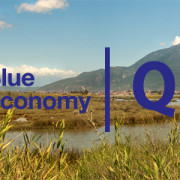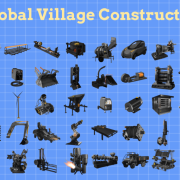After eight years of continuous research and the implementation of countless projects all over the world, it is now time to go back to the very start of the Blue Economy. In the following months the 100 initial ideas which were first published by the Blue Economy since 2009 will be updated. All the innovations have the same simple principle: imitate nature in its ability to produce no waste, no emissions and cascade everything in a closed system.
“It is our aim to share detailed information about the actual status of the projects which have been realized, based on the inputs of the Blue Economy. Some have failed, some have flourished, some are still fighting to leave the laboratory or prototype status – as in every entrepreneurial reality” says Markus Haastert, one of the initiators of the Blue Economy. In addition to this, Blue Economy will introduce several new innovations which have developed over the last few years. “For this we ask everyone to share his or her ideas with us. We are continuously looking for new ideas and projects and people who have made their own experiences with sustainable innovations” says Haastert.
Several projects have become reality since the first publication of the collection of ideas. Mushroom farming on coffee waste has become a global success story, and aquaponic-systems are being run in all possible scales. Foamglass has become a standard building material in just a few years, and bio-refineries convert waste into several valuable products. Many ideas have also entered the broad academic discourse. The research on heart-pacemakers without batteries has produced first promising results, and also the use of maggots for medicinal purposes is making big steps towards becoming a standard treatment for chronic wounds.
As the published presentation of the innovations are now updated, the aim is to integrate the experiences entrepreneurs made during the implementation of the ideas, to share them with the Blue Economy community and of course the public at large. At the same time, however, the cases will receive a more scientific background. For this aim, the team around Markus Haastert, Anne-Kathrin Kuhlemann and Prof. Stephan Breidenbach has been speaking to numerous scientists and researchers which have been involved in implementing the ideas of the Blue Economy.
This comes at a time when the concept of the Blue Economy is more important than ever before. The latest IPCC report warns of catastrophic consequences if emissions and waste production are not drastically reduced. The Blue Economy offers simple solutions which can be easily implemented by everyone who is just willing to try. Many start-up companies have proven that this is not just a fantasy, but reality. The aim of Blue Economy is to provide input on how products can be made with zero waste production and as little emissions as possible while creating jobs and generating social as well as monetary profits – for society and for the entrepreneurs.
The community of the Blue Economy has already developed ideas which will change humanity’s future. In the next years, Blue Economy strives to continue to do so in close collaboration with its community, which is bigger than ever before.



